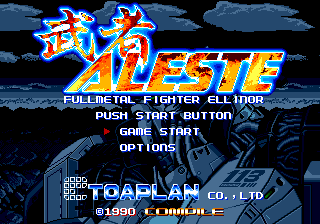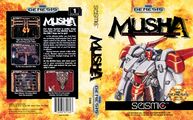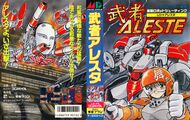Difference between revisions of "M.U.S.H.A."
From Sega Retro
(→Physical Scans: Games-x review) |
|||
| Line 56: | Line 56: | ||
| gamesx=92 | | gamesx=92 | ||
| gamesx_source={{num|10}} | | gamesx_source={{num|10}} | ||
| + | | megatech=71 | ||
| + | | megatech_source={{num|1}} | ||
}} | }} | ||
| − | |||
{{Scanbox | {{Scanbox | ||
| console=Mega Drive | | console=Mega Drive | ||
Revision as of 21:11, 9 September 2012
This short article is in need of work. You can help Sega Retro by adding to it.
| Musha Aleste: Full Metal Fighter Ellinor/M.U.S.H.A. | |||||
|---|---|---|---|---|---|
| System(s): Sega Mega Drive, Virtual Console | |||||
| Publisher: Toaplan (US Seismic) | |||||
| Developer: Compile | |||||
| Genre: Shoot-'em-Up | |||||
| |||||
|
CERO
Missing Parameter! |
Musha Aleste: Full Metal Fighter Ellinor (武者アレスタ), known in the US as M.U.S.H.A.: Metallic Uniframe Super Hybrid Armor, is a 1990 shoot-'em-up developed by Compile for the Sega Mega Drive and published in Japan by Toaplan and in the US by Seismic (there was no European release). It is the only Mega Drive game in Compile's Aleste series of shoot-'em-ups and the first released-overseas game in the series to not use the Power Strike name. It has since been released on at least the Japanese Virtual Console; according to Sega of Japan the game is licensed from naxat soft, who are thus presumed to have bought the rights from either Compile or D4Entertainment after Compile's bankruptcy.
Dire51, a supercomputer crafted to control a space colony, goes rogue and sends its attack robots, led by mech Big Asia., to destroy mankind. A team of fighters in giant mechs try to stop it, but all but one, Ellinor (Terri in the US version), are killed, leaving Ellinor to save humanity from destruction on his own.
Gameplay
| This article needs to be rewritten to to clean it up by someone who has the manual.... This article needs to be rewritten to conform to a higher standard of article quality. After the article has been rewritten, you may remove this message. For help, see the How to Edit a Page article. |
![]() shoots; there is rapidfire, but there will be a gap every few shots. There are two means of powering up. First, scattered throughout the levels are pods containing small vertical bars that flash red, green, and blue. Shooting at the pods will have them spit out the vertical bars, which will power up your main weapon. Second, some enemies produce larger, colored powerup balls called "P-chips." P-chips cause the mech to change color and adapt a subweapon which is fired with
shoots; there is rapidfire, but there will be a gap every few shots. There are two means of powering up. First, scattered throughout the levels are pods containing small vertical bars that flash red, green, and blue. Shooting at the pods will have them spit out the vertical bars, which will power up your main weapon. Second, some enemies produce larger, colored powerup balls called "P-chips." P-chips cause the mech to change color and adapt a subweapon which is fired with ![]() . P-chip abilities can be upgraded with further P-chips of the same color; taking a different color P-chip will replace whatever P-chip power the player already has. If the player gets hit, he will first lose his subweapon, then one life.
. P-chip abilities can be upgraded with further P-chips of the same color; taking a different color P-chip will replace whatever P-chip power the player already has. If the player gets hit, he will first lose his subweapon, then one life.
With enough of either chip, you get subships whose firing direction can be controlled with the ![]() button (see the HUD to see the current firing direction).
button (see the HUD to see the current firing direction).
Production Credits
- Game Design: Compile
- Supervisor: Jemini Hirono
- 68000-side Programmer: Yu-Ichi Toyama
- Z80-side Programmer: Kyo-Ra Yumi
- Art Director: Kazuyuki Nakashima
- Visual Cooperator: Janus Teramoto, Hiroshi Satou, Sho-Ji Yamada, Mashira FX-3
- Music Composer: Toshiaki Sakoda
- In the Japanese version, he is credited as "Mr.Sakoda". In the US version, he is credited as "Washija". The reason for this change is unknown.
- Sound Effect: Masanobu Tsukamoto (credited as "MATS")
- Special Thanks: Kouji Mizuta
- Test Player: Bobmitsu, Mikeo, Zenchi, Yasunari Watanabe
- Produced By: Moo Niitani
Physical Scans
| 75 | |
|---|---|
| Based on 30 reviews | |
External Links
| Aleste/Power Strike games for Sega systems/published by Sega | |
|---|---|
| Power Strike (1988) | Power Strike II (1993) | |
| M.U.S.H.A. (1990) | |
| GG Aleste (1991) | Power Strike II (1993) | GG Aleste 3 (2020) | |
| Robo Aleste (1992) | |
| M.U.S.H.A. (2008) | |
| Aleste Collection (2020) | |
| Aleste-related media | |
| Aleste Collection: Music Album (2022) | |
- ↑ 1700 igr dlya Sega, "" (RU; 2001-xx-xx), page 15
- ↑ 1700 igr dlya Sega, "" (RU; 2001-xx-xx), page 119
- ↑ Aktueller Software Markt, "März 1991" (DE; 1991-02-22), page 120
- ↑ Beep! MegaDrive, "January 1991" (JP; 1990-12-08), page 36
- ↑ Complete Guide to Consoles, "Volume IV" (UK; 1990-11-xx), page 32
- ↑ The Complete Guide to Sega, "" (UK; 1991-05-xx), page 48
- ↑ Console Mania, "Ottobre 1992" (IT; 1992-xx-xx), page 62
- ↑ Console XS, "June/July 1992" (UK; 1992-04-23), page 126
- ↑ Computer & Video Games, "February 1991" (UK; 1991-01-16), page 39
- ↑ Entsiklopediya luchshikh igr Sega. Vypusk 1, "" (RU; 1999-xx-xx), page 327
- ↑ Famitsu, "" (JP; 199x-xx-xx), page 1
- ↑ GamePro, "March 1991" (US; 1991-xx-xx), page 78
- ↑ Games-X, "27th June-3rd July 1991" (UK; 1991-06-27), page 39
- ↑ Génération 4, "Février 1991" (FR; 1991-xx-xx), page 99
- ↑ Joystick, "Mars 1991" (FR; 1991-0x-xx), page 128
- ↑ Sega Mega Drive Advanced Gaming, "January 1993" (UK; 199x-xx-xx), page 93
- ↑ Mega Drive Fan, "March 1991" (JP; 1991-02-08), page 99
- ↑ Mega Play, "February 1991" (US; 199x-xx-xx), page 44
- ↑ MegaTech, "Xmas 1991" (UK; 1991-12-06), page 79
- ↑ Mean Machines Sega, "October 1992" (UK; 1992-09-xx), page 140
- ↑ Power Play, "4/91" (DE; 1991-03-15), page 129
- ↑ Raze, "May 1991" (UK; 1991-03-28), page 66
- ↑ Sega Power, "October 1991" (UK; 1991-09-05), page 54
- ↑ Sega Pro, "November 1991" (UK; 1991-xx-xx), page 18
- ↑ Sega Pro, "April 1993" (UK; 1993-03-11), page 64
- ↑ Sega Force, "October 1992" (UK; 1992-09-10), page 68
- ↑ Sega Saturn Magazine, "September 1995" (JP; 1995-08-08), page 85
- ↑ Tricks 16 bit, "Tricks Sega Gold 800 igr" (RU; 1998-03-20), page 7
- ↑ VideoGames & Computer Entertainment, "March 1991" (US; 1991-0x-xx), page 42
- ↑ Video Games, "1/91" (DE; 1991-03-27), page 80


